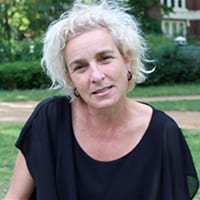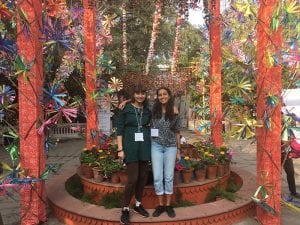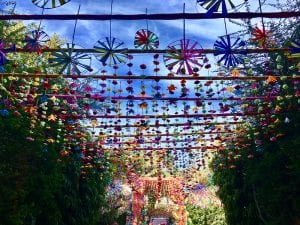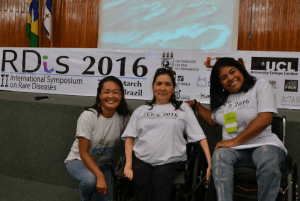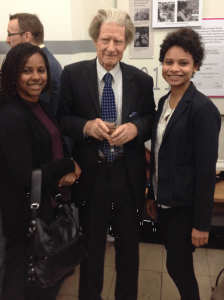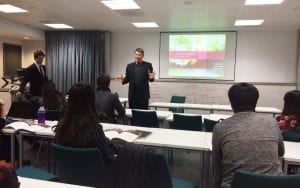This week, the Study Abroad team is running its annual Study Abroad Fair, celebrating the breadth and variety of UCL’s outward mobility opportunities and encouraging students to take full advantage.
UCL has exchange agreements with over 250 institutions in 40 countries across five continents, including 48 of the world’s top 100 universities.
Data compiled by GEO’s Strategic Data Manager, Alejandro Moreno, indicates that in 2016, UCL students participated in outward mobility experiences in destinations ranging from Los Angeles, California to Avarua, New Zealand.
The map below highlights the cities where these experiences took place:

UCL Study Abroad also provides students with different exchange and mobility options. This pie chart shows the percentage breakdown of student mobility in 2016 across the various types of mobility available.
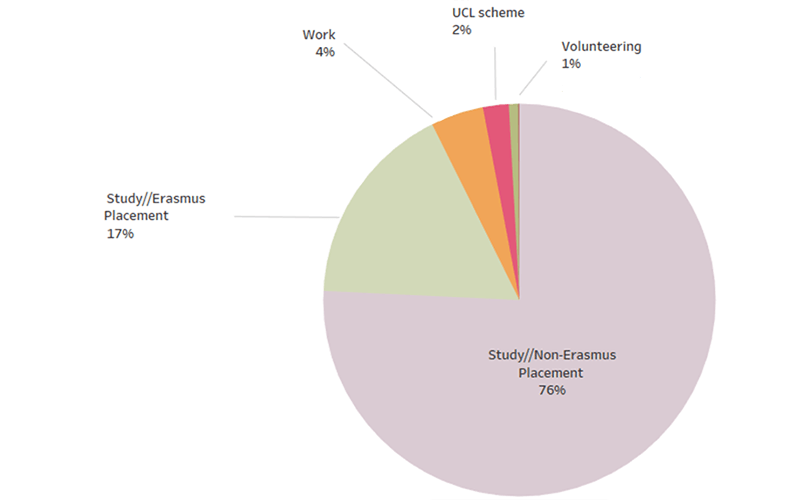
UCL students who have participated in an outward mobility opportunity – whether spending a year at a prestigious American university or a couple of months excavating historic sites in Israel – have recommended it as an extremely worthwhile experience.
Here are a few student testimonials.
Alexandra Willems, Law
“There is something very heartening about travelling halfway across the world and still finding people to complain about Eduroam with, in whatever language that may be.”
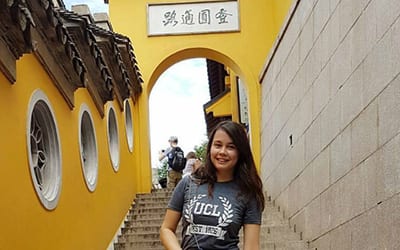 Alexandra Willems was one of six UCL students to join the summer Study China Programme 2017 – an immersive three-week Mandarin Chinese programme.
Alexandra Willems was one of six UCL students to join the summer Study China Programme 2017 – an immersive three-week Mandarin Chinese programme.
Reflecting on her experience, Alex said: “The main aspect of the trip that has stayed with me was the high level of organisation. There was a clear system of support, as well as a timetable and a placement test for the Mandarin Chinese Advanced Level speakers.”
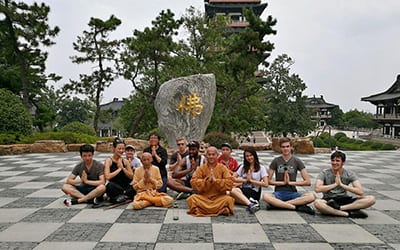 She added: “The programme included an afternoon of seeing the main sites in Shanghai, including the Bund, People’s Square and the Shanghai Museum, but much of our free time allowed us to explore our own personal interests in the city. My favourite place that I visited this time was the little-known underground Propaganda Art Museum, legally allowed but only in a restricted location”
She added: “The programme included an afternoon of seeing the main sites in Shanghai, including the Bund, People’s Square and the Shanghai Museum, but much of our free time allowed us to explore our own personal interests in the city. My favourite place that I visited this time was the little-known underground Propaganda Art Museum, legally allowed but only in a restricted location”
“In all, the Study China Programme is an amazing opportunity that is organised to a very high standard. Many thanks to all those involved in making it the insightful and educational experience that it was, and I am only saddened that I cannot do it again. Someone else will have to live that experience for me in future programmes, and what a lucky one they will be.”
Eshitha Vaz, Population Health
“The course has shifted and tilted my perspectives as to what it means to be a student.”
 Eshitha Vaz was awarded one of the Study Abroad tuition fee free places at the University of Sydney.
Eshitha Vaz was awarded one of the Study Abroad tuition fee free places at the University of Sydney.
At the University of Sydney, she got the chance to study Aboriginal Culture and History. Speaking on the impact of the course Eshitha said: “I feel I have become more culturally literate in the process and more aware of socio-political currents which have enhanced my career aspirations in turn.”
On her time in Australia, Eshitha added: “Certainly, the personal highlights of the time I spent in Australia were the friends I made and the places I got to visit. As recommended by our programme, I participated in a three-day ‘Surf Camp’ at Seven-Mile Beach in New South Wales where I learned how to surf. It was here that I formed my best friends throughout the trip, some of whom were studying at different Universities and schools in Sydney.”
“The landscape and natural beauty of Australia is undeniably powerful which is why I was so grateful that our timetable facilitated exploration. Two of my closest friends and I took a flight to Cairns, Queensland on a weekend and managed to go scuba diving and snorkelling at the Great Barrier Reef: one of the seven ‘Natural Wonders’ of the world and the world’s largest coral reef – an experience of a lifetime.”
Moiz Paracha, Chemical Engineering
“From Penguin Colonies to roaming through the Hout Bay, there is so much to do.”
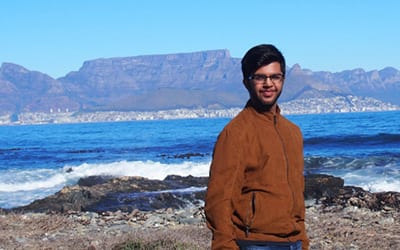 Moiz Paracha was part of the first UCL outward mobility experience to the University of Cape Town, where he joined the Sustainable Water Management in Africa course.
Moiz Paracha was part of the first UCL outward mobility experience to the University of Cape Town, where he joined the Sustainable Water Management in Africa course.
On his time in South Africa, Moiz said: “This was honestly an amazing experience, not just on an educational level but also on a personal one. The willingness and desire they have to genuinely make a change to the country is really what caught my attention. The experience, in general, is very eye-opening. The type of new people you can meet and the calmer pace of life is a great cultural experience.”
Reflecting on the landscape, he added: “The beauty of the country is phenomenal. Overall if you’re even vaguely thinking about applying, go do it because it’s something you won’t regret.”
To find out more about what opportunities are available to you and to read more student testimonials, visit the UCL Study Abroad website and follow them on Twitter @UCLcares.
Data visualisations courtesy of GEO’s Strategic Data Manager, Alejandro Moreno
 UCL students with an interest in Japan can apply for a fully-funded opportunity to visit Fukushima during January 2018.
UCL students with an interest in Japan can apply for a fully-funded opportunity to visit Fukushima during January 2018. The Japanese islands face an extraordinary range of natural hazards – earthquakes, volcanic eruptions, tsunami, landslides and tropical cyclones.
The Japanese islands face an extraordinary range of natural hazards – earthquakes, volcanic eruptions, tsunami, landslides and tropical cyclones. Close
Close








